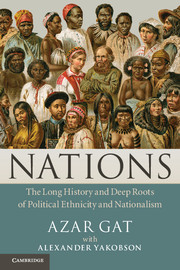Book contents
- Frontmatter
- Contents
- Acknowledgments
- 1 Introduction: is nationalism recent and superficial?
- 2 The evolution of kin–culture communities
- 3 From tribes to statehood
- 4 Premodern ethne, peoples, states, and nations around the world
- 5 Premodern Europe and the national state
- 6 Modernity: nationalism released, transformed, and enhanced
- 7 State, national identity, ethnicity: normative and constitutional aspects
- Conclusion
- Notes
- Index
- References
1 - Introduction: is nationalism recent and superficial?
Published online by Cambridge University Press: 05 February 2013
- Frontmatter
- Contents
- Acknowledgments
- 1 Introduction: is nationalism recent and superficial?
- 2 The evolution of kin–culture communities
- 3 From tribes to statehood
- 4 Premodern ethne, peoples, states, and nations around the world
- 5 Premodern Europe and the national state
- 6 Modernity: nationalism released, transformed, and enhanced
- 7 State, national identity, ethnicity: normative and constitutional aspects
- Conclusion
- Notes
- Index
- References
Summary
This book is the result of my deep dissatisfaction with the study of nations and nationalism as it is currently framed. Undergoing a spirited revival since the 1980s, the literature on the subject is marked by a great fault line which runs through the field. On one side of that line stand those who regard the nation as a creation of modernity. In their view, the nation emerged in Europe during the nineteenth century with the French and Industrial revolutions, or possibly sometime before, during the early modern period. For modernists, nations are a product of processes of social integration and political mobilization, which have welded together large populations hitherto scattered among parochial and loosely connected small rural communities spanning extensive territories. According to this perspective, it was only in the modern period, with the advent of print technology, wide-scale capitalist economies and, later, industrialization, urbanization, mass education, and mass political participation that such social integration and mobilization became possible, with active solicitation by the state. On the other side of the fault line stand those who defend, adapt, and develop the more traditionalist view of the nation (labeled “primordial” or “perennial”). They believe that nationhood, as a reality and a sentiment, is older, existed before modernity (even if not universally), perhaps as far back as antiquity, and not only in Europe but throughout the world.
This debate is further accentuated as it reverberates across the wider circles which have been drawn to the subject as it gained popularity. In the social sciences, history, philosophy, literature, and cultural studies, scholars working on related subject matters cite fashionable theories of nationalism, all too often radicalizing them even beyond their original form. Furthermore, cohorts of undergraduate and graduate students of an impressionable age, who are particularly receptive to sweeping pronouncements and criticism of accepted assumptions, are regularly exposed to exciting theories of nationalism as part of their disciplinary socialization and professional initiation. In this process the rift between the modernist and traditionalist schools is constantly reproduced. False dichotomies and captivating hyperboles have become the norm in the study of nationalism, to the degree that they are barely recognized as such.
- Type
- Chapter
- Information
- NationsThe Long History and Deep Roots of Political Ethnicity and Nationalism, pp. 1 - 26Publisher: Cambridge University PressPrint publication year: 2012



